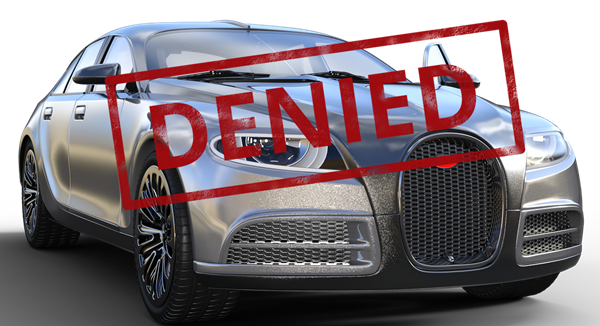Why Was My Car Loan Denied – 3 Major Reasons
Getting denied for a car loan can be frustrating and confusing, especially when you need reliable transportation. Understanding why lenders reject applications and knowing how to address these issues can significantly improve your chances of approval. Here are the three most common reasons car loans get denied and actionable steps to fix each problem.
GET CAR LOAN APPROVED
Fresh Start Consulting
7/6/20255 min read


Why Was My Car Loan Denied – 3 Major Reasons
Getting denied for a car loan can be frustrating and confusing, especially when you need reliable transportation. Understanding why lenders reject applications and knowing how to address these issues can significantly improve your chances of approval. Here are the three most common reasons car loans get denied and actionable steps to fix each problem.
1. Poor Credit Score or Credit History
Why it happens: Your credit score is the single most important factor lenders consider when evaluating car loan applications. Credit scores range from 300-850, and each range tells a different story to lenders:
Excellent (740-850): Prime rates and best terms available
Good (670-739): Competitive rates with most lenders
Fair (580-669): Higher rates, may need larger down payments
Poor (300-579): Subprime lenders only, very high rates
Traditional lenders (banks, credit unions) typically prefer scores above 650, while subprime lenders may work with scores as low as 500, though at significantly higher interest rates. A history of late payments, defaults, collections, repossessions, or bankruptcy can signal high risk to lenders.
Understanding what impacts your credit score:
Payment history (35%): Late payments, defaults, bankruptcies
Credit utilization (30%): How much of your available credit you're using
Length of credit history (15%): How long you've had credit accounts
Credit mix (10%): Variety of credit types (cards, loans, mortgages)
New credit inquiries (10%): Recent applications for credit
How to fix it:
Immediate actions (0-30 days):
Get your free credit reports from annualcreditreport.com from all three bureaus (Experian, Equifax, TransUnion)
Check your credit score using free services like Credit Karma, your bank's app, or credit card statements
Dispute any errors immediately – even small mistakes can impact your score. Common errors include:
Accounts that aren't yours
Incorrect payment history
Wrong account balances
Duplicate accounts
Outdated negative information (most items should fall off after 7 years)
Short-term improvements (1-3 months):
Pay down credit card balances to improve utilization ratio. Target below 30% on all cards, ideally below 10%
Pay off small balances completely – having more cards with zero balances can help your score
Request credit limit increases on existing cards (but don't use the extra credit)
Become an authorized user on a family member's account with good payment history
Pay all bills on time – even non-credit bills like utilities can hurt your score if they go to collections
Medium-term strategies (3-12 months):
Consider a secured credit card if you have limited credit history – you put down a deposit that becomes your credit limit
Look into credit-builder loans offered by credit unions – you make payments into a savings account, then get the money back
Keep old accounts open to maintain credit history length, even if you don't use them
Diversify your credit mix by having different types of credit (installment loans, credit cards)
Long-term rebuilding (12+ months):
Be patient with bankruptcy or major derogatory marks – these significantly impact scores but their effect diminishes over time
Consider working with a legitimate credit counseling agency (not credit repair scams)
Establish consistent payment patterns – even small improvements compound over time
Special considerations for car loans:
Automotive credit scores may differ from general credit scores – lenders often use FICO Auto Score 8, which weighs auto loan history more heavily
Previous car loan history matters – successfully paying off a previous auto loan can help even if other credit areas are weak
Recent credit improvements may not show up immediately, but lenders may consider explanations of positive changes
2. High Debt-to-Income Ratio
Why it happens: Lenders calculate your debt-to-income (DTI) ratio by dividing your monthly debt payments by your gross monthly income. Most prefer a DTI below 36-40%, including the new car payment.
How to fix it:
Pay down existing debts before applying, especially high-interest credit cards
Avoid taking on new debt in the months leading up to your car loan application
Consider debt consolidation to potentially lower monthly payments
Choose a vehicle with a lower monthly payment by selecting a less expensive car or extending the loan term
Increase your income through a side job or asking for a raise
Make a larger down payment to reduce the monthly payment amount
3. Too Many Recent Credit Inquiries
Why it happens: Every time you apply for credit, the lender performs a "hard inquiry" on your credit report, which can temporarily lower your score by 5-10 points. Multiple hard inquiries in a short period can compound this effect and signal to lenders that you're desperate for credit or taking on too much debt.
Understanding credit inquiries:
Hard inquiries: Occur when you apply for credit and can impact your score for up to 2 years (though the impact lessens over time)
Soft inquiries: Occur when you check your own credit or when companies pre-screen you for offers – these don't affect your score
Shopping window: Credit scoring models typically count multiple auto loan inquiries within 14-45 days as a single inquiry
Different rules for different credit types: Auto loans get more lenient treatment than credit cards for multiple inquiries
How to fix it:
Limit your applications to 2-3 lenders within a 14-45 day window to minimize credit score impact
Do your research first and apply only to lenders likely to approve your situation based on their stated criteria
Wait between applications if you need to apply to multiple lenders over time – space them out by at least 30 days
Consider pre-qualification options that use soft credit pulls (won't affect your score)
Focus on improving your credit before applying if you have multiple recent inquiries from other types of credit
Explain the inquiries to lenders if they ask – legitimate car shopping within a reasonable timeframe is understandable
Avoid applying for other types of credit (credit cards, personal loans) while shopping for a car loan
Understanding Credit in the Car Buying Process
Credit score ranges and typical car loan terms:
Excellent Credit (740-850):
Interest rates: 3-6% for new cars, 4-7% for used cars
Down payment: Often 0-10% required
Loan terms: Up to 84 months available
Lender options: All lenders compete for your business
Good Credit (670-739):
Interest rates: 6-10% for new cars, 7-12% for used cars
Down payment: 10-15% typically required
Loan terms: Up to 72 months commonly available
Lender options: Most traditional lenders will approve
Fair Credit (580-669):
Interest rates: 12-18% for new cars, 15-22% for used cars
Down payment: 15-25% often required
Loan terms: Usually limited to 60 months or less
Lender options: Credit unions, online lenders, some subprime lenders
Poor Credit (300-579):
Interest rates: 18-29% (or higher)
Down payment: 25-50% may be required
Loan terms: Often limited to 48 months or less
Lender options: Subprime lenders, buy-here-pay-here dealerships
Tips for different credit situations:
If you have no credit history:
Start building credit early with a secured credit card or credit-builder loan
Consider a co-signer with established credit
Look into first-time buyer programs offered by some manufacturers
Be prepared for higher rates but focus on building positive payment history
If you have bad credit:
Be realistic about rates – focus on rebuilding credit rather than getting the lowest rate
Avoid extending loan terms too far, as this increases total interest paid
Make payments on time to help rebuild credit for future purchases
Consider refinancing after 12-24 months of on-time payments
If you're recovering from bankruptcy:
Wait at least 12 months after discharge before applying
Rebuild credit slowly with secured cards or small loans
Save for a larger down payment to offset lender concerns
Be prepared to explain your circumstances and show financial stability
Final Thoughts
Getting denied for a car loan isn't the end of the road. By understanding why you were denied and taking steps to address the underlying issues, you can improve your chances of approval. Remember that each lender has different criteria, so a denial from one doesn't mean you'll be denied everywhere.
Take time to honestly assess your financial situation, work on the areas that need improvement, and approach your next application with a stronger financial profile. With patience and the right preparation, you'll be much more likely to secure the car financing you need.
Overwhelmed – Need Help? The specialists at Fresh Start Consulting are here to help
CONTACT INFO
Address
Bringing People Hope
Email to find out how it works!
info@freshstartconsult.com
FRESH Start Consulting
100 Matawan Road
Matawan, NJ 07747
Suite 325 #1129
